Do you have a question about the Evinrude E-TEC 90 H.O. and is the answer not in the manual?
Highlights key features for user convenience and operation ease.
Details the robust construction and dependable components of the engine.
Describes the engine's emission compliance and noise reduction features.
Explains the purpose of the safety alert symbol used in the guide.
Provides essential general safety rules and recommendations for boat operation.
Outlines safety precautions related to the installation and ongoing maintenance of the outboard.
Instructions for recording essential identifying information of the outboard engine.
Details where to find and record the model and serial numbers of the outboard.
Guidance on reporting stolen outboards to the appropriate authorities.
Information on how to obtain additional technical documentation and service manuals.
Important safety information provided via hang tags and labels on the outboard.
Describes the standard hang tag attached to the outboard with safety instructions.
Explains the meaning and usage of various warning symbols found in the guide.
Details the specific hang tag for H.O. models regarding initial setup and performance.
Identifies the labels found on remote controls for safe operation.
Specifies the hang tag for Pontoon Series outboards, highlighting their intended use.
Identifies components specific to V4 and V6 models within this HP range.
Identifies components specific to the 90° V6 models in this HP range.
Details the types of oils recommended for Evinrude E-TEC outboards and their specifications.
Information on alternative oils that meet required standards if brand-specific oils are unavailable.
Explains how the oiling system works and important considerations for its operation.
Step-by-step instructions for priming the outboard's oiling system to prevent damage.
Specific procedure for priming the oil supply hose and connections.
Instructions on how to properly fill the outboard's oil tank.
Procedures for priming the oil pump, including specific steps for certain models.
Instructions for safely operating the cap on a portable fuel tank.
Recommendations for fuel types and octane ratings for use in North America.
Guidance on fuel recommendations for use outside of North America.
Importance and specifications of boat-mounted water-separating fuel filters.
Instructions for connecting fuel hoses and ensuring a secure, leak-free system.
Procedure for priming the fuel system after the outboard runs out of fuel.
Critical safety warnings related to engine operation, propeller, and environmental awareness.
Procedures for safely starting and stopping the Evinrude E-TEC outboard engine.
Explanation and importance of using the engine cut-off switch and tether cord.
Detailed steps for starting the Evinrude E-TEC outboard, including pre-start checks.
Checks to perform immediately after the engine starts, such as water pump indicator.
Correct procedure for shutting down the Evinrude E-TEC outboard engine.
Directs users to the specific guide for comprehensive information on ICON systems.
Advice on choosing appropriate remote controls, emphasizing start-in-gear prevention.
Explains the integrated engine cut-off and key switch system within the ICON control setup.
Overview of various features offered by ICON remote control systems for different mounting styles.
Instructions on how to shift gears using the ICON control system.
Guidance on adjusting speed and fine-tuning engine RPM with ICON controls.
How to synchronize multiple engines using the ICON system's SYNC button.
Identification of controls and features for the side mount remote control system.
Identification of controls and features for the single lever binnacle mount control.
Identification of controls and features for the concealed side mount remote control.
Identification of controls and features for the dual lever binnacle mount control.
Explanation of the power trim and tilt system, its functions, and potential hazards.
How to adjust the trim tab for optimal steering effort and boat performance.
Describes the function of the tilt range for maneuvering the outboard.
Guidance on setting the trim angle for acceleration and optimal running conditions.
How to adjust the outboard for operation in shallow water conditions.
Instructions on how to engage and disengage the tilt support lever for securing the outboard.
Procedures for manually tilting the outboard using the manual release valve.
Explains the purpose and components of the engine monitoring system.
Describes the self-test procedure for various engine monitoring gauges during startup.
Details the types of warnings generated by the engine monitor and their meanings.
Explains the SAFE mode which limits engine speed to prevent damage.
Precautions and recommendations for operating the outboard in cold or freezing conditions.
Information on anode protection and flushing procedures for salt water use.
Guidelines for operating boats with dual outboard engines.
How the outboard compensates for altitude and propeller recommendations.
Precautions to prevent gearcase damage when operating in shallow water.
Procedures and safety measures to follow when towing the boat.
Advice on operating in weedy water to prevent overheating and performance issues.
Safety precautions and procedures for trailering the boat with the outboard attached.
Instructions on using the trailering bracket to secure the outboard during transport.
Explains EPA regulations and manufacturer responsibilities regarding engine emissions.
Information on checking and replacing anti-corrosion anodes to prevent galvanic corrosion.
Procedures for flushing the cooling system with fresh water after use.
Details on fuse types, replacement, and troubleshooting related to blown fuses.
Recommendations for washing and waxing the outboard's exterior.
Guidance on repairing minor scratches on the engine covers.
Information on servicing spark plugs and potential hazards.
Procedures for servicing an outboard engine that has been submerged in water.
Instructions for storing the outboard between uses, focusing on draining the cooling system.
Comprehensive guide for preparing the outboard for long-term off-season storage.
Specific winterization steps for outboards with remote controls.
Winterization procedures tailored for outboards operated with tiller controls.
Winterization steps for outboards using a foot throttle remote control.
General guidelines and procedures for installing the outboard engine.
Guidance on ensuring the correct transom height for outboard installation.
General instructions for mounting the outboard onto the boat's transom.
Requirements and recommendations for installing boat-mounted fuel filters.
Details on battery requirements and selection for the outboard system.
Information on connecting an accessory battery for charging purposes.
Importance of monitoring water pressure for cooling system health.
Basic service notes related to battery and electrical components.
Guidance on selecting the correct propeller for the boat and outboard application.
Information and advice on repairing damaged propellers.
How to adjust the trim tab to compensate for steering torque and improve handling.
Instructions for adjusting the tilt limiter cam to prevent contact with the motor well.
Technical specifications for 90 H.O. and 115 HP V4 models.
Technical specifications for 115 H.O. and 130 HP V4 models.
Technical specifications for 135, 150, and 175 HP V6 models.
Technical specifications for the 200 HP V6 models.
Technical specifications for 200, 225, and 250 HP 3.3 Liter models.
Technical specifications for 250 and 300 HP 3.4 Liter models.
Defines the coverage period and conditions for the limited warranty.
Lists parts and conditions that are not covered under the warranty.
Outlines limitations on implied warranties and exclusion of incidental damages.
Specifies the duration of warranty coverage for different usage types.
Lists the requirements that must be met to be eligible for warranty coverage.
Steps to follow when a defect appears to obtain warranty service.
Explains BRP's responsibilities in repairing or replacing defective parts.
Procedures for transferring warranty coverage to a new owner.
Contact information and steps for resolving warranty disputes or seeking assistance.
Details the warranty coverage period for emission control parts.
Outlines the owner's duties regarding maintenance and proper use for warranty validity.
Defines the scope of the international limited warranty for outboard engines.
Outlines liability limitations for international warranty coverage.
Lists items not covered under the international warranty.
Specifies warranty periods for commercial and private use internationally.
Lists conditions required for international warranty coverage eligibility.
Specifies additional warranty terms applicable exclusively to products sold in France.
| Brand | Evinrude |
|---|---|
| Model | E-TEC 90 H.O. |
| Category | Outboard Motor |
| Language | English |
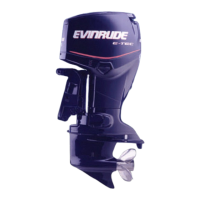


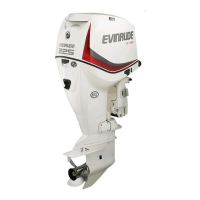
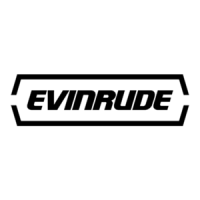


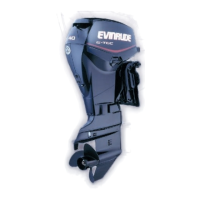

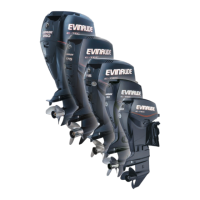


